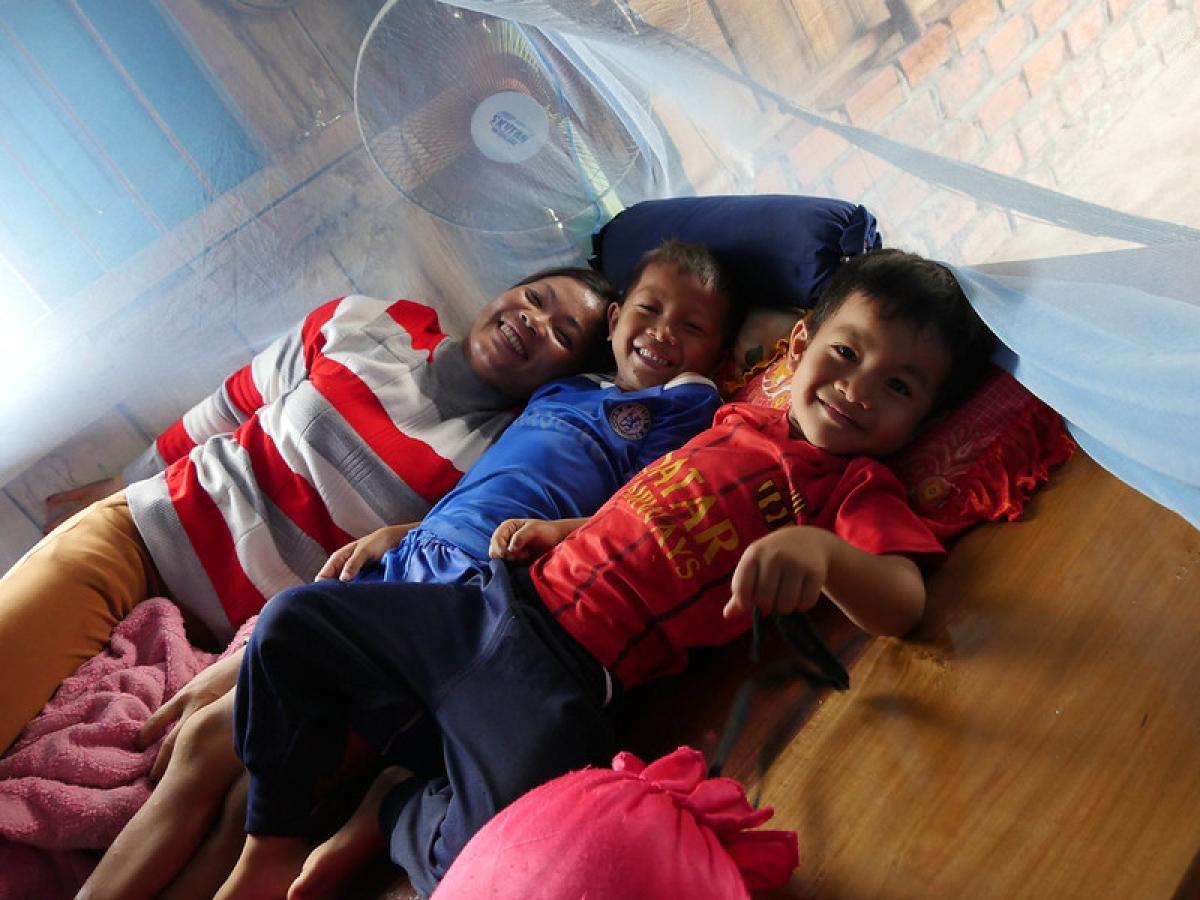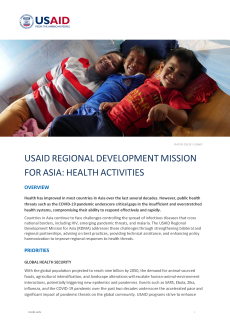OVERVIEW
Health has improved in most countries in Asia over the last several decades. However, public health threats such as the COVID-19 pandemic underscore critical gaps in the insufficient and overstretched health systems, compromising their ability to respond effectively and rapidly.
Countries in Asia continue to face challenges controlling the spread of infectious diseases that cross national borders, including HIV, emerging pandemic threats, and malaria. The USAID Regional Development Mission for Asia (RDMA) addresses these challenges through strengthening bilateral and regional partnerships, advising on best practices, providing technical assistance, and enhancing policy harmonization to improve regional responses to health threats.
PRIORITIES
Global Health Security
With the global population projected to reach nine billion by 2050, the demand for animal-sourced foods, agricultural intensification, and landscape alterations will escalate human-animal-environment interactions, potentially triggering new epidemics and pandemics. Events such as SARS, Ebola, Zika, influenza, and the COVID-19 pandemic over the past two decades underscore the accelerated pace and significant impact of pandemic threats on the global community. USAID programs strive to enhance country, multi-sectoral, and transboundary capacities to prevent avoidable outbreaks, detect threats early, and promptly respond to and contain emerging infectious diseases, including zoonoses, at their source before posing a threat to global public health. Throughout Asia, USAID-supported Global Health Security (GHS) activities encompass technical assistance to develop and fortify preparedness plans, enhance diagnostic laboratory capacities, target disease surveillance to high-risk interfaces, bolster rapid response capabilities, train current and future One Health professionals, improve antimicrobial resistance surveillance, reduce antibiotic usage, advance understanding of emerging infectious diseases, and encourage community response and behavioral changes aimed at mitigating disease emergence and transmission risks. USAID/RDMA provides technical, programmatic, and general support to missions in Asia that GHS represents, including Bangladesh, Burma, Cambodia, India, Indonesia, Lao PDR, Malaysia, Nepal, Philippines, Thailand, and Vietnam.
HIV and AIDS
HIV prevalence remains high among men who have sex with men, sex workers, and transgender women, particularly in Asia. As part of the U.S. President’s Emergency Plan for AIDS Relief, which aims to control the HIV/AIDS epidemic, USAID/RDMA supports partnerships with civil society stakeholders and provides technical assistance to Burma, Cambodia, India, Indonesia, Kazakhstan, Kyrgyz Republic, Lao PDR, Nepal, Papua New Guinea, Philippines, Tajikistan, and Thailand by implementing effective, data-driven strategies to reach, test, treat, retain, and prevent HIV among high-risk key populations. In Thailand, USAID/RDMA-supported initiatives have successfully introduced pre-exposure prophylaxis (PrEP) to prevent HIV acquisition through community-based organizations (CBOs), implemented same-day community-based HIV treatment initiation, established certification for community health workers and CBO accreditation at national and provincial levels, and supported CBOs in registering as HIV service providers in the national health system through the National Health Security Office (NHSO). Over the past five years, key population CBOs have reduced their reliance on international donors for operating budgets, securing between 50 percent and 60 percent funding for HIV services from the NHSO.
Malaria
Malaria remains a public health concern in the Greater Mekong Subregion, despite considerable progress made in the past decade towards reducing malaria morbidity and mortality rates. Compounded by the emergence and spread of resistance to antimalarial drugs, inadequate access to prompt diagnosis and treatment, particularly among mobile and migrant populations, malaria persists as a challenge throughout the subregion. Through the U.S. President’s Malaria Initiative, USAID/RDMA has strengthened the health systems and capacities of National Malaria Programs (NMPs) in the Greater Mekong Subregion to address artemisinin resistance, improve surveillance systems, support commodities for uninterrupted service delivery, and regularly update antimalarial drug treatment policies. RDMA has also supported the Thai NMP in training health officers from Laos and Thailand to enhance cross-border entomological skills for malaria elimination, thereby advancing regional coordination crucial for achieving malaria elimination in the Mekong by 2030.
CONTACT INFORMATION
For more information, please visit www.usaid.gov/asia-regional or info-rdma@usaid.gov.


